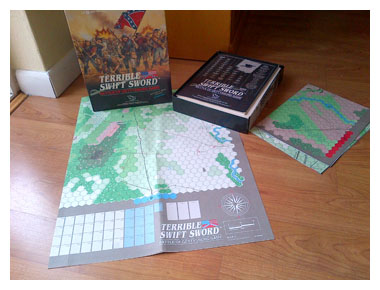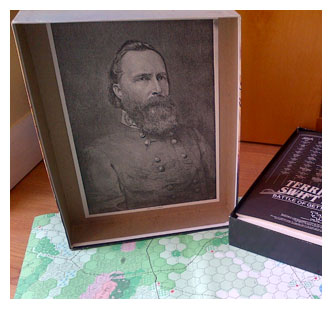Our favorite games. We reminisce fondly upon them. They line the shelves in the halls of our memory; over time some collect dust, but for those that endure, they remain in our lives to be recalled, replayed, and shared. The definition of favorite varies. Some make favorite because they provide incredible action, memorable stories, engaging mechanics, or intense visuals. But the games that really reach our most hallowed heights of “favorite games” are those that attach us to a time in our past.
For me one of those games comes from an unlikely genre: classic board war games. Terrible Swift Sword is an old game, originally published by the long defunct SPI in 1976, it was updated with a second edition in 1986 by TSR when that company bought the rights to SPI’s intellectual property. The second edition copy that sits firmly  in an honored place on my game shelf was a gift by one of my oldest friends. Together we spent countless hours in our youth playing the classic war games, from the venerable Tactics II to contemporary games like Ultimatum. The year 1986 was at the twilight of classical board war gaming and this copy of Terrible Swift Sword was the last boxed war game either of us purchased. That in itself gives it an emotional edge, being the last of its kind; but what made this even more special is that it was bought in Gettysburg. We were both Civil War buffs and his trip to Gettysburg while on leave with the U.S. army was one of those seminal moments for any student of the conflict. I knew he would be visiting the battlefield (by a written letter to me, yes handwritten; this was 1986 and email was unheard of), but when he came back with a copy of a game we had read about but never had seen a copy of (remember no internet either), well, I was ecstatic. At this point in our lives things were changing, I was in college, he had his military career, and the time we had to sit down to a lengthy board game was hard to come by. That scarcity of opportunity made the few times we were able to play even more special.
in an honored place on my game shelf was a gift by one of my oldest friends. Together we spent countless hours in our youth playing the classic war games, from the venerable Tactics II to contemporary games like Ultimatum. The year 1986 was at the twilight of classical board war gaming and this copy of Terrible Swift Sword was the last boxed war game either of us purchased. That in itself gives it an emotional edge, being the last of its kind; but what made this even more special is that it was bought in Gettysburg. We were both Civil War buffs and his trip to Gettysburg while on leave with the U.S. army was one of those seminal moments for any student of the conflict. I knew he would be visiting the battlefield (by a written letter to me, yes handwritten; this was 1986 and email was unheard of), but when he came back with a copy of a game we had read about but never had seen a copy of (remember no internet either), well, I was ecstatic. At this point in our lives things were changing, I was in college, he had his military career, and the time we had to sit down to a lengthy board game was hard to come by. That scarcity of opportunity made the few times we were able to play even more special.  Being students of the battle, we often discussed General James Longstreet’s actions with lively debate, so naturally, we placed a picture of him in the box top so that when we faced off he could be placed upright and stand firm over the action, judging our strategies. The games went longer because we talked, laughed, and had fun just being there, sharing that time.
Being students of the battle, we often discussed General James Longstreet’s actions with lively debate, so naturally, we placed a picture of him in the box top so that when we faced off he could be placed upright and stand firm over the action, judging our strategies. The games went longer because we talked, laughed, and had fun just being there, sharing that time.
All of this history transformed that copy of Terrible Swift Sword from another of the many, to one of the special; one of the unforgettable that I take down from my shelf with care, open the box, and remember.

